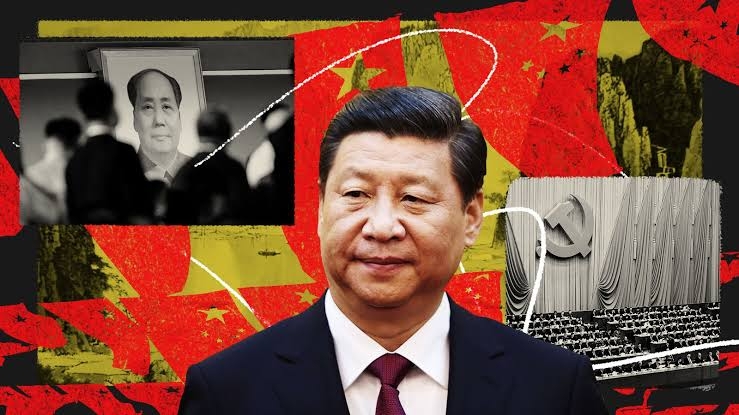Chinese communist imperialist policies
Over the past century, the Chinese government, led by the Chinese Communist Party (CCP), which follows extreme leftist ideology, has placed maximum emphasis on fulfilling its imperialist ambitions, in addition to maintaining its grip on power through bloodshed.

Imperialism has always been at the core of communist ideology. This has also been reflected in front of the world with the increasing power of China in the last one or two decades.
Over the past century, the Chinese government, led by the Chinese Communist Party (CCP), which follows extreme leftist ideology, has placed maximum emphasis on fulfilling its imperialist ambitions, in addition to maintaining its grip on power through bloodshed.
However, the big problem in this context is that this imperialist policy of China is not limited to any one dictator, any particular period or any particular region, but basically it is the continuously running undeclared policy of the Chinese Communist Party.
What is meant here by undeclared is that formally China considers itself a sovereign socialist nation, whereas there is no such concept of nation in the leftist ideology advocated by the Chinese government i.e. CCP.
Calling it a contradiction or a special system, as China's current dictator Xi Jinping keeps repeating, is nothing more than an illusion and basically the aim of the party is to directly and indirectly spread its influence across the world in the name of leftist ideology. This is just the spread of imperialist policies.
Now the serious problem is that in recent years, these policies of the Chinese dictatorial regime have emerged as a serious challenge to global peace and stability, which is affecting from Africa to the Indo-Pacific region and from Sri Lanka to the Caribbean nations.
In this sequence, China's ruling system is not desisting from the policy of debt trap in remote small countries, establishment of military bases, military encroachment with neighboring countries and direct and indirect conflicts.
Although China has very slyly termed these conflicts as minor disputes citing bilateral relations, the reality is that this is purely a part of the effort to establish leftist ideology across the world.
Understand it this way, while on one hand many small African nations have been trapped by China in its debt trap policy, on the other hand many subcontinental nations like Pakistan, Bangladesh and Myanmar are also in the trap of this policy of debt in the form of investment.
The situation of the island nation Sri Lanka is well known, being affected by the Chinese loan policy, apart from this, China is also trying hard to establish its dominance in small nations like Maldives and Nepal.
Apart from this, moving forward with the policy of single hegemony in the Indo-Pacific region, which is considered very important for the global supply chain, China is also exploring possibilities for itself in the Pacific nations through investment, loans and bilateral relations.
The agreement with Solomon Islands and talks with Pacific nations are part of this exercise of China.
Through the policy of debt trap in these small nations, China's objective is to use the sovereign lands of these nations for its military ambitions, so that if necessary, China can use its military bases established in these nations to defeat the powers that challenge it. Could do against.
This is why China's increasing interference in the Pacific region has emerged as a direct challenge to the sovereignty of Australia and small democratic nations.
Apart from the problems caused by the Chinese imperialist system in these remote areas, China has also emerged as an equally big challenge to the sovereignty of its neighboring nations.
In this sequence, if we leave some nations as exceptions, then China has entangled many nations including Bhutan, Japan, Vietnam in border disputes.
Apart from this, China keeps showing its dominance even with small sovereign nations like Philippines, Indonesia, Brunei in the South China Sea or Taiwan Strait region.
Talking about India, for the past years the armies of both the nations are standing face to face in Eastern Ladakh, for which no concrete solution has been found despite various rounds of military talks.
According to experts, China is trying to prolong this dispute and, seeing the opportunity, acquire sovereign Indian land through a limited war.
Apart from the talks, China's actions on the border also indicate this. The current situation is that while on one hand China is talking about resolving the dispute through military talks, on the other hand China is indiscriminately building infrastructure in the border areas.
In this context, the American military commander who was visiting India, while talking to the media after meeting the Indian Army Chief, had said that the construction of infrastructure by China on the border is very worrying. It is also known that China has deployed state-of-the-art war planes at its Hotan airbase bordering eastern Ladakh.
Apart from India, China has also appeared very aggressive in recent years on Taiwan, which has been the center of controversy for a long time. In recent times, the statements issued by the Chinese government regarding Taiwan also indicate that China's preparation regarding Taiwan is somehow for its forcible acquisition.
To strengthen its influence at the global level, China is targeting the Caribbean countries as well as small European nations. The layers of its secret policy of involvement with Arab nations and Taliban through Pakistan are slowly coming to light.
Apart from this, China's involvement in creating anarchy in democratic nations through Islamic fundamentalists has also been exposed.
Overall, China is trying as much as possible to fulfill its imperialist policies, for which it has chosen the inclusive path of military empowerment, debt trap policy and factional politics with the help of Russia.
Its ultimate objective is to establish itself as a superpower and establish an extremist leftist system in the world. Therefore, it is very important that the ongoing disputes with China and other nations should be recognized as a global threat and not as a bilateral dispute.


